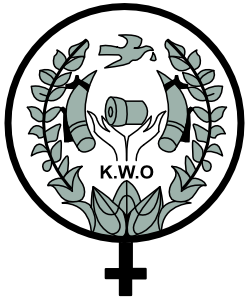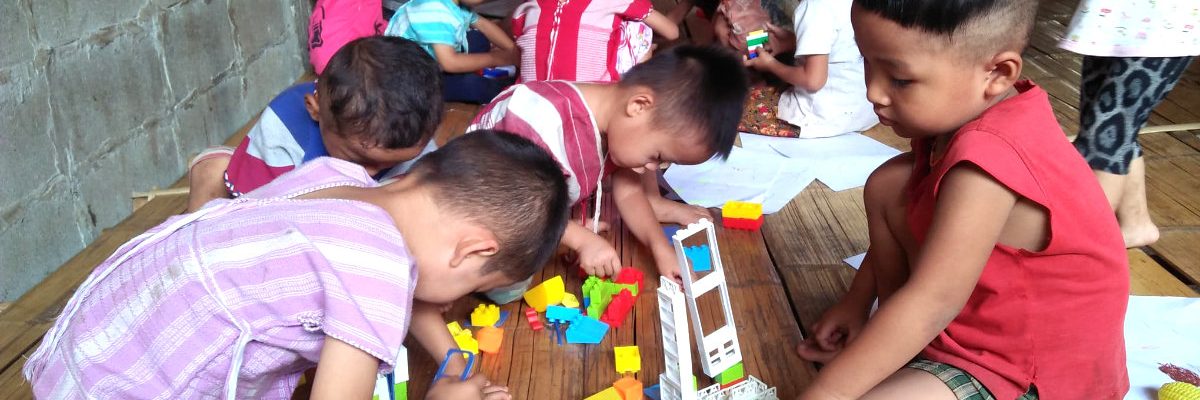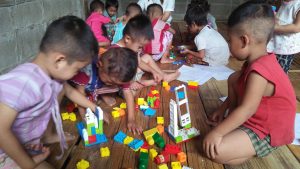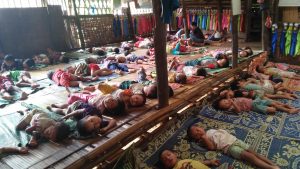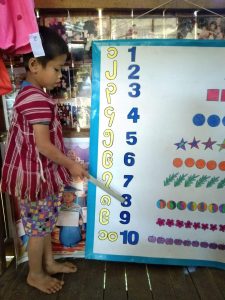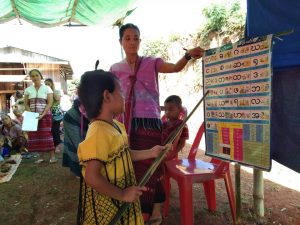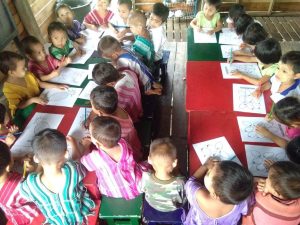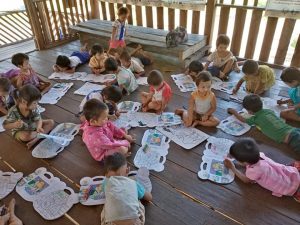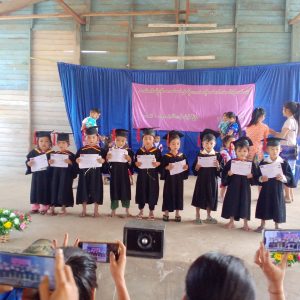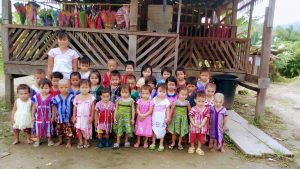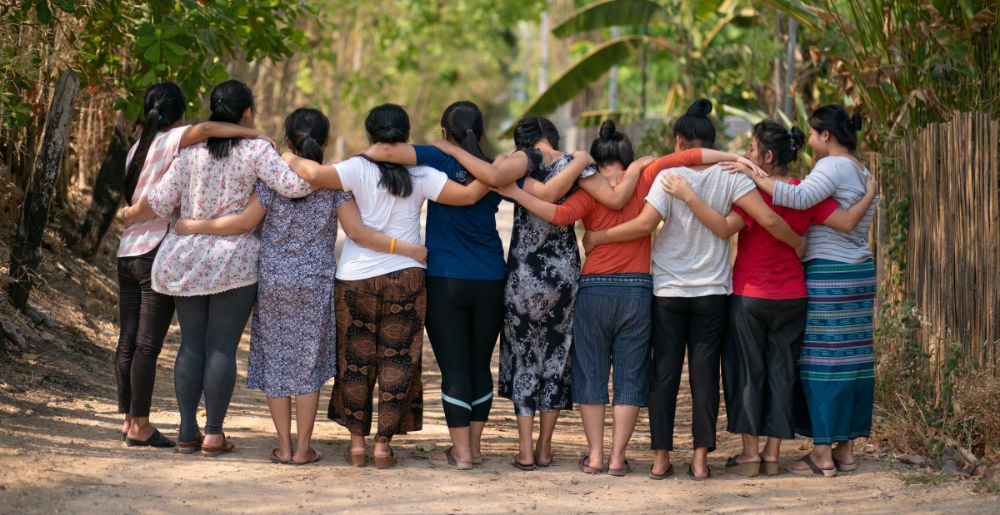The children supported by this project live in the conflict-affected areas in Karen State, Burma. There has been an ethnic struggle for freedom from military oppression in Burma for more than 70 years. The ethnic Karen people have been especially persecuted by successive Burmese military regimes. Years of instability has left the rural Karen people extremely poor and struggling to provide for their most basic needs. Families, including young children, are often undernourished, and emotionally distressed. Village communities are often very isolated and most of them receive no national or international assistance. In villages where a nursery school has been established, between 70% and 90% of the children are enrolled. Education and Health services are minimal. The Nursery School provides a safe space for young children to learn and develop. Children successfully move into local Primary Schools each year and benefit from the preparation for schooling they have received in the Nursery Schools.
1. Project Goal
To support and develop community-run nursery schools which provide quality early childhood development and child protection programming in partnership with the local community.
2. Location
We implement this project in 8 sites:
- In a selection of villages across the 7 districts in Karen State, Burma.
3. Overview
Under this project in collaboration with local communities KWO currently supports 84 village Nursery Schools. We provide basic education and safe childcare services that promote physical, mental and social development of each child equally. We have developed our own Early Childhood Curriculum which promotes Karen indigenous culture and learning in our mother-tongue. We support better hygiene and nutrition for young children through education and a daily feeding and sanitation program.
More than 2,300 children aged 2.8 to 5 years were enrolled in the Nursery Schools this year. 230 women are trained as teachers for early childhood development and education. They care for the children in a safe environment, provide a stimulating learning program, and engage with parents to strengthen good childcare practices. Parents and community members are actively involved in the management of the Nursery Schools and play a vital role in supporting the school initiatives. KWO provides training, management support, funding and material supplies for each Nursery School.
The schools are normally open 161 days a year, five days a week from 8.30am to 3:00pm. There are 3 age groups in Nursery Schools and the curriculum is similar for all children, with adjustments of difficulty for each age group. Class A= oldest children (4-5 years old); Class B= middle (3-4 years); Class C= youngest (2.5-3 years). If it’s a small school with only 2 teachers, they set up 2 classes with slightly adjusted age groupings.
This project is linked closely with KWO’s other, more established Early Childhood Development Project which is implemented in two refugee camps in Thailand. Tools and methodologies for teacher training, curriculum, parenting, and project management are jointly developed and implemented by the two project teams.
KWO and Nursery School managers co-ordinate with local ethnic education service providers inside Karen State. In collaboration with community leaders KWO established “Nursery School Committees” in all sites which ensure the participation of the community and local governance structures. The committees vary in size depending on the size of the village and the school, from 3-8 members. The committees’ role is to increase local support and understanding of young children’s needs, and to help with the logistics of the project. There are currently almost 450 active members on the local committees with equal numbers of men and women.
4. Beneficiaries and Participants
In the 2023-24 academic year:
- 2,321 children under 5 years of age benefited from safe childcare, education appropriate to age, and improved hygiene and nutrition (1,171 girls and 1,150 boys).
- At least 5,000 parents and carers developed deeper understanding of child development and parenting.
- 2,300 women accessed reliable, safe childcare and increased their participation in community work, decision-making processes, and income generation.
- 239 project staff were employed and received training and stipends.
5. Main Activities
The main activities we conduct are:
- Early childhood development and care program
- Protect and promote child rights among children and their families
- Hygiene education and supplies
- Early childhood curriculum development promoting indigenous language and culture.
- Purchase and deliver school supplies
- Clean water for drinking and washing
- Nutritious feeding program to reduce chronic malnutrition.
- Cooking and nutrition training for teachers, managers, parents.
- Maintenance of 84 buildings and compounds to ensure a safe and comfortable learning environment for children.
- Piloting new kitchen gardens and training in some Nursery Schools
- Produce local teaching aids.
- Training of Trainers workshop
- Teacher Training and mentoring.
- Provide formal “Parents Education” workshops using the “Parents Education Manual” developed by KWO. And countless home visits to meet with parents who need more support.
- Maintain and strengthen child protection standards and practices among all staff and with the community.
- Coordination and engagement with ethnic education stakeholders, Nursery School Committees, parents and community members.
- Community-based fund-raising activities
- Organize Family Days and Special Events.
6. Who does the work?
In the 2023-24 school year, we supported 84 Nursery Schools. There are currently 239 project staff implementing this project. All staff are women. The team includes those living in Karen State: 13 field co-ordinators, 84 School Directors (who also teach), 136 teachers, and 2 cooks. And those who live in towns along the border: 4 project management staff.
The 504 members of the 84 School Committees provide volunteer labour and support, especially with building maintenance, food donations, and logistics.
7. The Impact
We asked parents and teachers to identify the impact this village-based project has had.
Safe Childcare
The nursery schools successfully provide safe places for young children to play and learn during the daytime. When parents have work outside the home, or go to the farm, the village Nursery School is a reliable, safe place for mothers to leave young children. It means the children are not hurt or injured during the day, and the mothers do not feel worried. We have seen in the villages where there is a Nursery School, more women take part in community decision making, or are able to work in the community.
Young children have improved health and hygiene
The children receive nutritious food each day, and there are adequate hygiene supplies for everyone. They learn new behaviours for eating and cleaning. As a result they are healthier, they are cleaner, they put on weight, they are sick less often. The children influence their parents and siblings as well, so we see better hygiene and health in the whole family.
Children improve social and communication skills
Children have more confidence and we see positive behavior changes when they attend nursery school. They learn how to share materials and help one another, how to respect and obey the teachers, elders and their parents. If we compare children at the beginning of the school year and at the end, we can see they are much more polite, and can express themselves more clearly. They gained new skills by taking up leadership roles among their peers in the activities organized at Nursery School. They can sing or perform with confidence. We see our children are more at ease in relationships with other people. They developed leadership skills and learned to understand one another with better communication which improved their relationships with others. We see that our culture is respected also, the teachers speak our language and they help our children to know and feel proud of our culture.
Building knowledge, thinking skills, and life skills and prepared for Primary School
The children learnt basic reading, counting, and writing in a supportive atmosphere, so when they are old enough, it is easier for them to start primary school and succeed in the classroom. We see that the children learn many useful thinking skills, not only rote learning. They also build up basic skills for their self-management in daily life. They are young but they can do many things for themselves. In the school they know to put the books back on the shelves carefully and systematically, they do not tear the pages of the books anymore. They love listening to stories or reading simple books that enrich their knowledge to improve daily life skills. We see that they are happy children and that is really important for us. We saw that the nursery school program developed an enthusiasm for education among children and parents.
